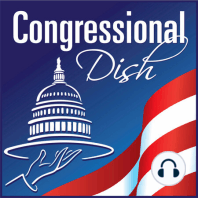56 min listen
CD099: April Takes a Turn
ratings:
Length:
95 minutes
Released:
Jun 27, 2015
Format:
Podcast episode
Description
Medicare, cybersecurity, favors for banks, mortgages, IRS bullying, a tax cut for the rich, and a couple of good ideas are highlighted from the law and bills that passed Congress in April. Please support Congressional Dish: Click here to contribute with PayPal or Bitcoin; click the PayPal "Make it Monthly" checkbox to create a monthly subscription Click here to support Congressional Dish for each episode via Patreon Mail Contributions to: 5753 Hwy 85 North #4576 Crestview, FL 32536 Thank you for supporting truly independent media! Laws H.R. 2: Medicare Access and CHIP Reauthorization Act of 2015 Sustainable Growth Rate (SGR): Enacted in 1997, the SGR paid doctors for Medicare patients based on the growth in gross domestic product (GDP). If Medicare costs increased more than GDP, doctors payments were cut across the board. According to the American College of Physicians, this formula for payment has meant that the Medicare payment rate to doctors is essentially the same as it was in 2001 and cuts have been postponed so many times that doctors' payments would have been cut by 21% if this bill was not signed into law by April 1. This new law: Repeals the Sustainable Growth Rate formula for Medicare payments to doctors. Increases payments to doctors by 0.5% through 2019 while the payment rate transitions away from a pay-per-service model. The new system will be based on scores assessed by a "Merit-based Incentive Payment System" which will be created by the Secretary of Health and Human Services which will go into effect on January 1, 2019. A list of "quality measures" will be posted every November and doctors can choose which one's will be used in their performance assessments. Doctors will be rated and paid based on a performance score from 0 to 100, which will take improvement into account starting in the second year of the program. The GAO will report on the effectiveness of the system by October 1, 2021. An advisory committee will be created to propose alternative payment models, which will be lump sum payments to group practices and medical homes. Sets a goal for Medicare records to be electronic nation-wide by December 31, 2018. Extends a bunch of existing Medicare programs, including the Children's Health Insurance Program (which covers low income kids whose parents make too much for Medicaid) for two years. Doubles the length of Medicare administrator contracts from five to ten years. Expands nationally a prior authorization requirement for "repetitive scheduled non-emergent ambulance transport" Prohibits the printing of social security numbers on Medicare cards Pays for the new system by... Denying access to policies with no out of pocket costs to people who enter Medicare after January 1, 2020. For all future beneficiaries, they will have to pay at least $147 per year (the cost of the Medicare Part B deductible). Increasing the premiums for relatively high income individuals. People who have a gross income between $133,501 and $160,000 ($267,000 and $320,000 for a couple) will pay a 65% premium instead of 50%, and people above that will pay an 80% premium rate. This would increase with inflation beginning in 2020. Has a huge increase in the levy that the Treasury Department can impose on tax delinquent service providers, increasing it from 30% to 100%, effective on October 16, 2015. Will have auditors distribute information about improper payments to help reduce the number of them. Creates a paper-free option for Medicare notices, saving mail fees. The effect this bill will have on the budget will not be counted. The Congressional Budget Office (CBO) estimates this bill will increase the budget deficit by $141 billion. Passed 392-37 in the House and 92-8 in the Senate Sponsored by Rep. Michael Burgess of Texas 95 pages Bills H.R. 1731: National Cybersecurity Protection Advancement Act of 2015 For reference, here's the text as of March 2015 of the Homeland Security
Released:
Jun 27, 2015
Format:
Podcast episode
Titles in the series (100)
CD005: Lame Ducks Return: During another slow week in Congress, Jesse Jackson Jr. resigns, Nydia Velazquez (NY) ignores a subpoena, the Department of Homeland Security gets investigated, the Senate fights about filibusters, and the Trans-Pacific-Partnership is confirmed as... by Congressional Dish
